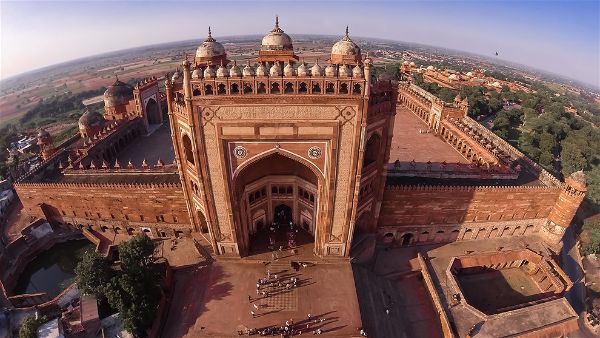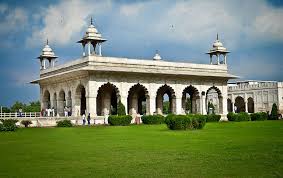Fatehpur Sikri is a small city in northern India, it is, founded by a 16th-century Mughal emperor. Fatehpur Sikri was a once blooming capital of the Mughal Emperor Akbar till 1585, when the city was abandoned due to the proximity of the area to the Rajputana neighborhood and scarcity of water. The capital was moved back to Agra and the town remained a ghost town.
Tourist Places In And Around Fatehpur Sikri
Buland Darwaja
literally means magnificent gate in Urdu and the total height of the structure is 54 meters from the ground. It was built 1601, by the Emperor Akbar to commemorate his victory over Gujarat. The architecture of the doorway is unique and the craftsmanship is brilliant. Buland Darwaza is made from red sandstone with carved marble and granite inlays. On the main gateways an inscription in Persian reads Jesus son of Mary said, The world is a bridge pass over it, but build no houses upon it. He, who hopes for a day, may hope for eternity; but the World endures but an hour. Spend it in prayer for the rest is unseen The inscription is exemplary of the religious tolerance during the reign of the great Mughal Emperor.

Diwan I Khas
Diwan I Khas is one of the most interestingly orate buildings in Fatehpur Sikri. The most exquisite things to see here is the central tower which is also known the Lotus Throne is exemplary of the fine detail in this stone carved mastery. The pillar supports a walkway which connects the 4 corners of the first floor into a central circular platform meant for the emperor Akbar. The hall was meant for special people and religious leaders who wanted or were summoned for a private audience with the Emperor.

Tomb Of Salim Chishti
Tomb Of Salim Chishti is essentially the most important buildings in the palace complex and was built between 1580 and 1581. The building is made of carved white marble and is one of the finest examples of the artistic stone carving mastery in medieval India. The architecture is a cross between the Hindu and Mughal architecture and is surrounded with intricately carved marble screens known as ‘Jaalis’ from all sides. The mausoleum belongs to the Sufi saint Salim Chishti who lived at a ridge near the city. During the time the city was inhabited, it served as one of the major centers of the Sufi movement in India.
visit our website for more information about the monuments of Fatehpur Sikri and nearby Agra. we have best customize tour packages for visiting in india.
Best India Tour Packages
Golden Triangle Tour Packages
Rajathan Car Rental Packages
